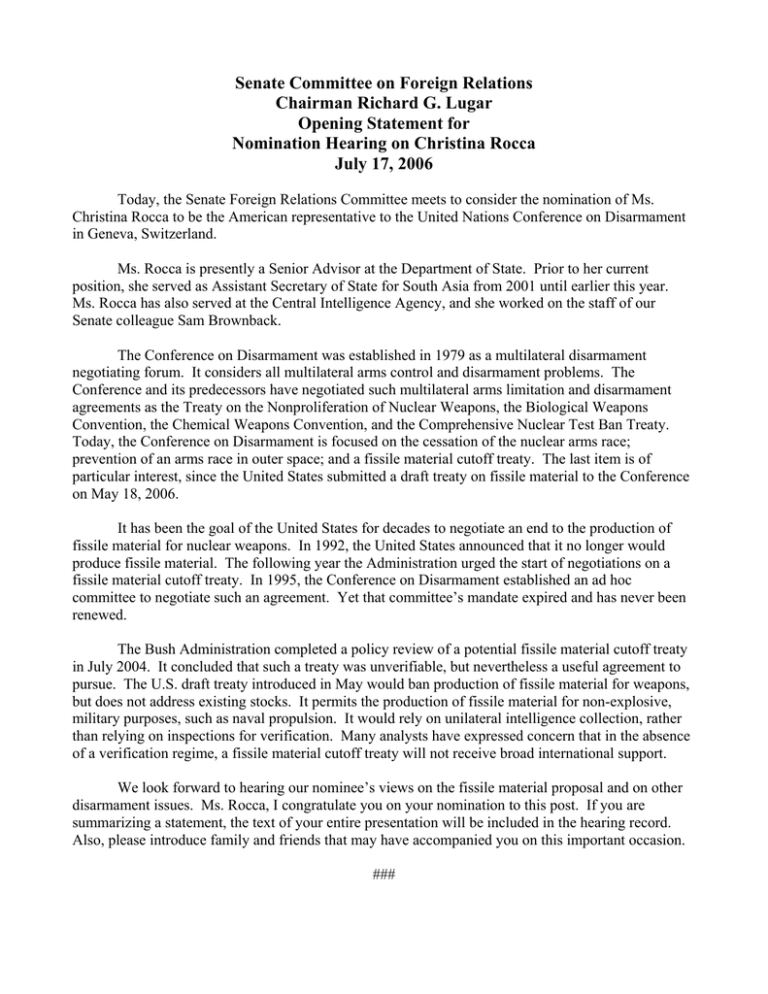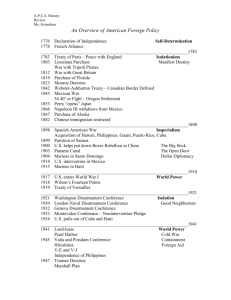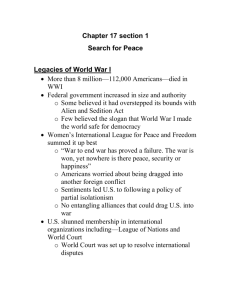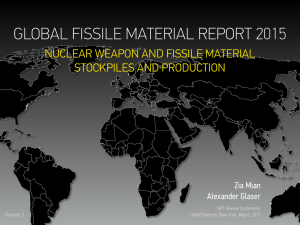Senate Committee on Foreign Relations Chairman Richard G. Lugar Opening Statement for
advertisement

Senate Committee on Foreign Relations Chairman Richard G. Lugar Opening Statement for Nomination Hearing on Christina Rocca July 17, 2006 Today, the Senate Foreign Relations Committee meets to consider the nomination of Ms. Christina Rocca to be the American representative to the United Nations Conference on Disarmament in Geneva, Switzerland. Ms. Rocca is presently a Senior Advisor at the Department of State. Prior to her current position, she served as Assistant Secretary of State for South Asia from 2001 until earlier this year. Ms. Rocca has also served at the Central Intelligence Agency, and she worked on the staff of our Senate colleague Sam Brownback. The Conference on Disarmament was established in 1979 as a multilateral disarmament negotiating forum. It considers all multilateral arms control and disarmament problems. The Conference and its predecessors have negotiated such multilateral arms limitation and disarmament agreements as the Treaty on the Nonproliferation of Nuclear Weapons, the Biological Weapons Convention, the Chemical Weapons Convention, and the Comprehensive Nuclear Test Ban Treaty. Today, the Conference on Disarmament is focused on the cessation of the nuclear arms race; prevention of an arms race in outer space; and a fissile material cutoff treaty. The last item is of particular interest, since the United States submitted a draft treaty on fissile material to the Conference on May 18, 2006. It has been the goal of the United States for decades to negotiate an end to the production of fissile material for nuclear weapons. In 1992, the United States announced that it no longer would produce fissile material. The following year the Administration urged the start of negotiations on a fissile material cutoff treaty. In 1995, the Conference on Disarmament established an ad hoc committee to negotiate such an agreement. Yet that committee’s mandate expired and has never been renewed. The Bush Administration completed a policy review of a potential fissile material cutoff treaty in July 2004. It concluded that such a treaty was unverifiable, but nevertheless a useful agreement to pursue. The U.S. draft treaty introduced in May would ban production of fissile material for weapons, but does not address existing stocks. It permits the production of fissile material for non-explosive, military purposes, such as naval propulsion. It would rely on unilateral intelligence collection, rather than relying on inspections for verification. Many analysts have expressed concern that in the absence of a verification regime, a fissile material cutoff treaty will not receive broad international support. We look forward to hearing our nominee’s views on the fissile material proposal and on other disarmament issues. Ms. Rocca, I congratulate you on your nomination to this post. If you are summarizing a statement, the text of your entire presentation will be included in the hearing record. Also, please introduce family and friends that may have accompanied you on this important occasion. ###





